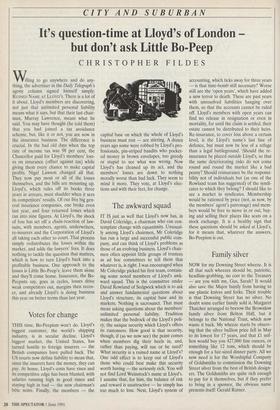The awkward squad
IT IS just as well that Lloyd's now has, in David Coleridge, a chairman who can con- template change with equanimity. Unusual- ly among Lloyd's chairmen, Mr Coleridge has run a large and successful public com- pany, and can think of Lloyd's problems as those of an evolving business. Lloyd's chair- men often appoint little groups of trustees as ad hoc committees to tell them that whatever is, is right. I was encouraged when Mr Coleridge picked his first team, contain- ing some noted members of Lloyd's awk- ward squad. This is the committee under David Rowland of Sedgwick which is to ask and answer fundamental questions about Lloyd's structure, its capital base and its markets. Nothing is sacrosanct. That must mean asking questions about the members' unlimited personal liability. Tradition makes that the bedrock of the Lloyd's poli- cy, the unique security which Lloyd's offers its customers. How good is that security, though, if (as we now see) the point comes when members dig their heels in, and, rather than paying, will sue or be sued? What security is a ruined name at Lloyd's? One odd effect is to keep out of Lloyd's those who could best make this security worth having — the seriously rich. You will not find Lord Weinstock's name at Lloyd's. I assume that, for him, the balance of risk and reward is unattractive — he simply has too much to lose. Next, Lloyd's system of accounting, which ticks away for three years — is that time-bomb still necessary? Worse still are the 'open years', which have added a new terror to death. These are past years with unresolved liabilities hanging over them, so that the accounts cannot be ruled off. Lloyd's members with open years can find no release in resignation or even in mortality, for until the claim is settled, their estate cannot be distributed to their heirs. Re-insurance, to cover loss above a certain level, is the Lloyd's name's last line of defence, but must now be less of a refuge than a legal battleground. \Should the re- insurance be placed outside Lloyd's, so that the same deteriorating risks do not come round and round the market like a bad penny? Should reinsurance be the responsi- bility not of individuals but (as one of the Rowland team has suggested) of the syndi- cates to which they belong? I should like to see a market in syndicates. Membership would be rationed by price (not, as now, by the members' agent's patronage) and mem- bers would be free to move in or out, buy- ing and selling their places like seats on a stock exchange. It is a healthy sign that these questions should be asked at Lloyd's, for it means that, whatever the answers, Bo-Peepism is out.


















































 Previous page
Previous page